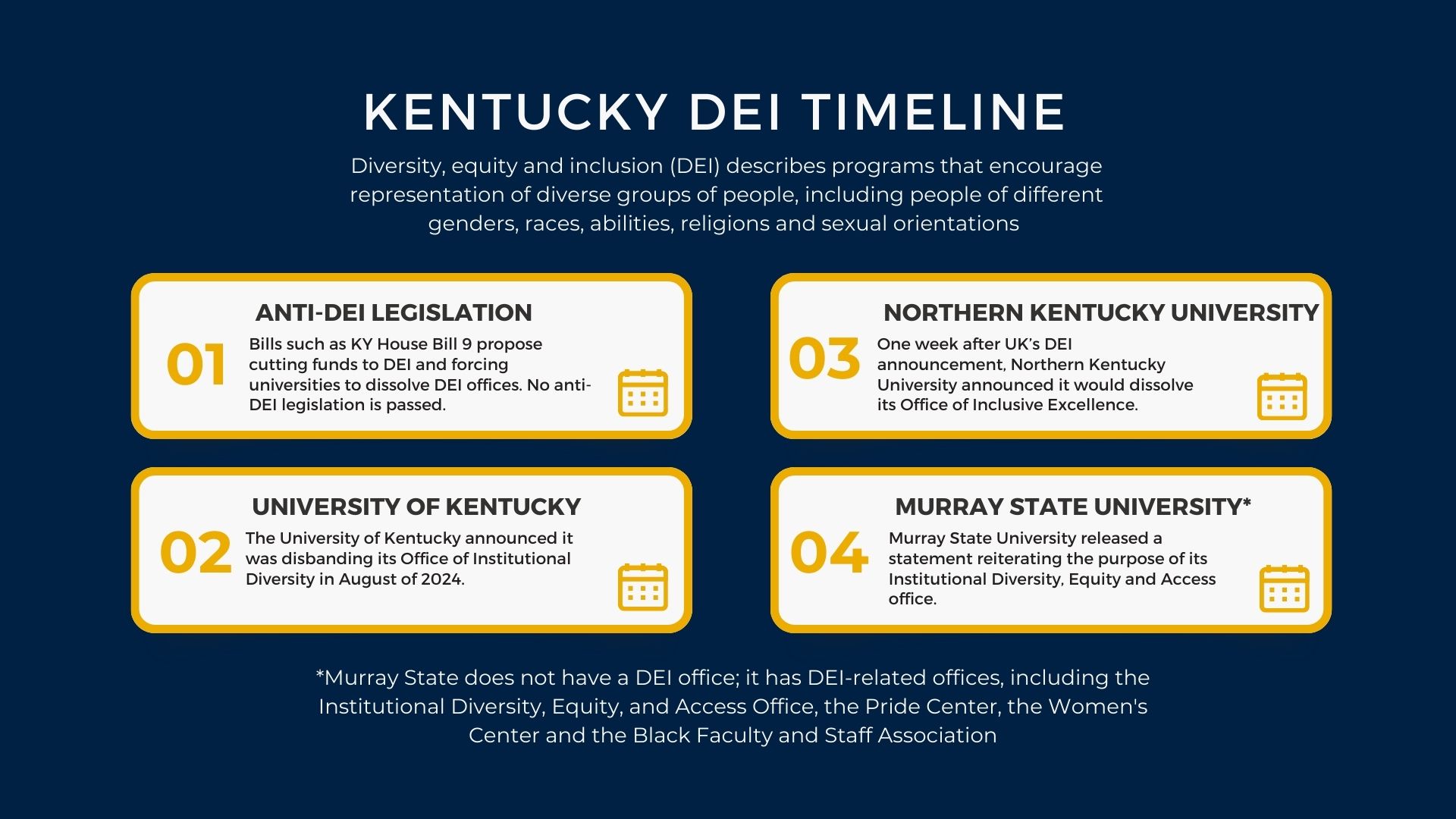Following the decision by two Kentucky universities to disband their diversity offices and pressure from state lawmakers regarding Diversity, Equity and Inclusion (DEI) policies in public universities, the future of diversity efforts on the Murray State campus remains uncertain.
The University of Kentucky was the first university to announce it was disbanding its Office of Institutional Diversity. One week later, Northern Kentucky University announced it would dissolve its Office of Inclusive Excellence. Both decisions follow a nation-wide trend of public universities shelving their DEI offices.

While Murray State has no dedicated DEI office, the university has a number of offices and programs meant to foster a diverse and inclusive campus environment. These include the Institutional Diversity, Equity, and Access Office, which is focused on Title IX and university adherence to federal and state anti-discrimination policy. Other diversity resources include the Pride center, the Women’s center and the Black Faculty and Staff Association. Some campus departments have also adopted diversity programs of their own, such as the Department of Journalism and Mass Communications Diversity, Equity, and Inclusion in Teaching program (E.D.I.T.). A number of diversity academic programs also exist, such as the College of Humanities and Fine Arts Gender and Diversity Studies minor.
The university has not announced any specific plans regarding DEI programs on campus. When contacted for a statement, the university reiterated the purpose of its IDEA office, and maintained the office’s impartiality and adherence to state, federal, and university policy.
“Murray State University has had an Office of Institutional Diversity, Equity and Access (IDEA) for many years. Pursuant to state and federal laws, this office is focused on equal opportunity including Title IX and operates in a compliance function for complaints, investigations and training regarding illegal discrimination and illegal harassment consistent with the university’s non discrimination statement. This office has a responsibility for remaining impartial and therefore holds no advocacy role.”
Though Murray State has not given any plans regarding its diversity policy, there are concerns regarding efforts by the state legislator to end DEI policies in public universities. During the 2024 legislative session, a number of anti-DEI bills were introduced to the legislator. These include House Bill 9, which would require postsecondary educational institutions to dissolve any DEI offices and initiatives and would prevent funding for any diversity programs or scholarships.
While no anti-DEI legislation passed during the 2024 legislative session, concerns have been raised over their possible reintroduction during the next legislative session. Michael Bordieri, chairman of the Governmental Affairs Committee, said his committee was continuing to monitor policies by the state legislator targeting DEI, and expects such policies to be a significant part of the next legislative session.
“As I think we predicted last year, and what we are seeing now, anti-DEI and other efforts continue, and in some cases appear to be intensifying, and we should expect that to be a significant aspect of the upcoming session as well,” Bordieri said.
Those against DEI policies have argued that such policies are divisive and promote discriminatory practices in universities. When commenting on the NKU decision, Kentucky Sen. John Schikel said the campus diversity office is a “dividing force,” and said its disbanding would promote a successful educational environment by judging students based on academic excellence and not race or gender.
Pro-DEI activists, however, say these policies promote fairness and equality among students. And that policies geared towards diversity and equity promote academic success among minority students who could be at a disadvantage.
Sidda Roche, president of Alliance club, discussed the importance of DEI policies on campus. Roche said that such policies promote a safe environment for students who are otherwise at risk.
“In my opinion, there is no proper education without diversity. You literally cannot learn about the world if you are not learning about diversity,” Roche said. “DEI protects more people on campus than I think the general population understands. Without resources like the Pride Center and other places like it, people wouldn’t have a safe space to go. Despite what the university likes to say, there is bigotry on this campus, and a lot of it. DEI efforts are in place to protect people from said bigotry.”
S.G. Carthell, executive director of the Office of Student Enrichment, Academic Excellence and Leadership also discussed the role of diversity policies in academic institutions. Carthell has spent much of his career dealing with the issue of diversity at Murray State.
Carthell discussed the difference between matters of compliance and of changing people’s attitudes towards diversity. While institutions like Murray State have offices that enforce compliance with state and federal laws regarding rights and protections for students and minority groups, such institutions are limited when it comes to changing people’s attitudes towards matters of diversity and inclusion. Using compliance models to change people’s opinions is vulnerable to legal questions and attacks.
According to Carthell, institutions must focus on providing fair and equal opportunities to all students regardless of race or gender. And while special accommodations for certain groups may be necessary, such accommodation is always subject to legal regulation.
“What we all have to begin to do in my opinion is be able to find that common ground,” Carthell said.
He further explained there will be times when institutions will need to provide support for groups in certain areas. However, that support is regulated by law. And while laws may be passed that challenge how institutions provide support for those groups, those laws don’t take away from the mission of the institutions. “I would just think that it begins to challenge some of the stereotypes that people have when they think about diversity, equity, inclusion.”
Regarding decisions by other universities to disband their diversity offices, Carthell said the decisions were more complex. According to Carthell, the universities’ decision to disband their offices may just mean a restructuring and reassignment of those offices’ duties and personnel within the university. In the UK and NKU cases, both universities shifted focus to other offices such as UK’s Office for Community Relations and NKU’s Center for Student Inclusiveness.
A university’s decision to disband its diversity office may not mean an end to its diversity programs and efforts. Instead, Carthell argues, we should look at how such decisions actually affect campus students and faculty.
Carthell also expressed his pride in Murray State for its efforts to provide support for its students, and its ability to provide special help to targeted groups while still providing the same level of support to all its students.
While the closure of UK and NKUs diversity offices does display a trend for universities in Kentucky, it is unclear if Murray State plans to follow in their lead. The future of diversity efforts on campus may rest mainly on how the state legislature plans to vote on such matters in the next legislative session.


























































































